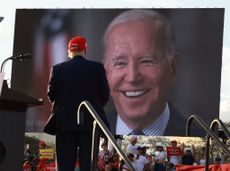The roots of football
In the factory towns where pro football began, says Rich Cohen, violence was always part of the game.
WILLIAM “PUDGE” HEFFELFINGER was America’s first professional football player, paid $500 to man the line for the Allegheny Athletic Club in Pittsburgh’s Recreation Park. That game, played on Nov. 12, 1892, was just a scrum in the mud, less sport than brawl. You took an elbow, spit some teeth, drove on. But 120 years later, professional football, the closest thing we have to a national pastime—the NFL brings in $9 billion a year—is on a kind of precipice, with stories about brain injuries and medical issues suddenly competing for newspaper inches with the games themselves.
The worry is not just that people will stop watching the game; it’s that parents will stop letting their kids play, starving the league of talent. Speaking on The Tonight Show, Terry Bradshaw, the great Pittsburgh Steelers quarterback, predicted the demise of football, saying that if he had a son, he would not let him sign up. “The fear of them getting these head injuries,” he explained, “it’s just too great for me.”
I did not play tackle football and won’t let my sons play, in part because I fear my Grandma Esther was right: It will rattle your brains. But I love to watch—the nastier the better. It’s a guilty pleasure. “I like it when you hit a guy just right…shake him up so bad you see little snot bubbles,” as the once-feared linebacker Brian Bosworth said. The NFL can pass as many rules to protect players as it wants, but the blindside knockout remains paramount, a practice just as popular with “teenagers who are getting this from high school football or youth football,” said Chris Nowinski, the former Harvard football player. Nowinski works with the Boston University brain bank, where doctors have pioneered the study of chronic traumatic encephalopathy, which afflicts so many retired players. “The day we can diagnose them while they’re alive,” he says, “will be a day we’ll have to ask the world, ‘What percentage of kids is allowable to have this disease from playing a sport?’”
Subscribe to The Week
Escape your echo chamber. Get the facts behind the news, plus analysis from multiple perspectives.

Sign up for The Week's Free Newsletters
From our morning news briefing to a weekly Good News Newsletter, get the best of The Week delivered directly to your inbox.
From our morning news briefing to a weekly Good News Newsletter, get the best of The Week delivered directly to your inbox.
I DECIDED TO take a trip to pro football country, to trace the sport’s history, but most of all, to determine if violence is part of its DNA. I’d become conflicted about my love of the game. My favorite team has long been the 1985 Bears, which featured the most brutal defense in NFL history. But as the findings have come in from the Boston brain bank, my pleasure has kinked and complicated. By returning to the sport’s early, sacred sites, I hoped to reconnect with the mythic superstructure of the game and test my faith in football.
Starting in Connecticut, I followed Interstate 87 west across the Tappan Zee Bridge, then headed into New Jersey: Springsteen country, warehouses and weeds drifting across my windows. Pro football was popular in factory towns from the start, and many of the first professionals were miners, mill towners, dead-end boys. Most began playing primitive variations of the game on abandoned plots, in the scrub grass between the factory sheds.
The Pennsylvania Turnpike goes right by Carlisle, but the tollbooth operator had never heard of Jim Thorpe or the school he made famous early last century. Thorpe was 16 when he enrolled—it was called the Carlisle Indian Industrial School then, a Dickensian setup meant to prepare Native Americans for a life in the machine trades. It’s where Thorpe carried his first football, began to sprint, hurdle, throw the javelin. Many still consider him the best athlete the United States has ever produced.
The stadium where Thorpe played survives, a grassy field overlooked by a grandstand of the old looming variety. White men filled the bleachers on Saturday afternoons, excited to watch Indian teams fight, a spectacle that, a few decades before, could be seen only in a Wild West show or in an actual battle. Thorpe was the star of the first great pro team, the Canton, Ohio, Bulldogs; he was also the NFL’s original commissioner. He gave the league a uniquely American identity: Whereas baseball descended from fey British games like rounders, pro football began with a big Indian gamboling across a field.
Sign up for Today's Best Articles in your inbox
A free daily email with the biggest news stories of the day – and the best features from TheWeek.com
Thorpe was a sad figure by the time he played for Canton, the gold medals he had won in Stockholm at the 1912 Olympics having been stripped by the Olympic Committee, which claimed that a summer of semipro baseball had invalidated his amateur status. He was drunk a lot of the time. In his later days, Thorpe, who worked as a bar-room bouncer, a ditch digger, and an extra playing Indians in B-movies, was a premonition of all those broken gridiron heroes who could find no perch after their last down had been played. There has always been an implicit bargain for football players: They trade tomorrow for right now, handing their middle years over to their youthful selves to devour in the course of a few seasons.
THE ROAD TO Pittsburgh leads through tunnels and past towns, and the city appears all at once, a scrim of bridges and buildings stained to a deep mottled rust. The first pro leagues began here, in sooty towns that stud bituminous mountains, first as a recreation for workers—a diversion between shift whistles—then as factory squads that became competitive to the point of cheating, which meant ringers playing under assumed names, paid under the table, until those teams outgrew the mills and the leagues were organized. The Packers, who joined the NFL in its second season, are now the last of the factory-town teams.
I made two stops on my way out of Pittsburgh. Beaver Falls, the birthplace of Joe Namath, the great New York Jets quarterback; and Aliquippa, the hometown of legendary Bears coach Mike Ditka. The great Baltimore Colts quarterback Johnny Unitas worked on a road crew in Aliquippa. It might be the bleakest place I’ve ever been. Once the booming home of J & L Steel, it began its decline when the mill closed in the 1980s. Just about every store on Main Street is boarded. The people who remain appear trapped. The high school is on a hill above town. The football field is in a valley below—ratty, rocky, surrounded by row houses built for workers who died a generation ago. In such places, it can seem men have just one thing to offer: their bodies, which they fed to the factories and to the game.
What happens to such a place when the world changes? When an economy, which had been about bodies and brains, gives way to an economy about brains alone? In Aliquippa, you realize that the violence of the sport is not something that evolved but was a point of the game from the beginning, the hitting a cure for every kind of mood, the way, when you are so low, you have to reach up to touch bottom, nothing beats getting drunk, going to town, and picking a fight with a man twice your size. For some, pro football’s appeal is the aerial assault, the ballet of receivers getting both feet in bounds, but for many of us, it’s the Stone Age pleasure of watching large men battle to the point of exhaustion.
The country opens up as you cross into Ohio, the gloomy mill towns giving way to corn and silos, farms that stretch to the horizon. The Pro Football Hall of Fame in Canton had my car in its tractor beam. This is where the league was really formed, in the showroom of Ralph Hay’s Hupmobile dealership in 1920, the team owners—the Bears’ George Halas among them—sitting on the running boards of the sedans. The exhibit begins with a statue of Thorpe and continues through displays of old equipment: cleats, jerseys, football pants, and, most tellingly, helmets, which evolved from none at all to leather, plastic, then whatever space-age material they’re made of now. Ironically, football may have gotten more dangerous as helmets have improved—in part because the helmet itself has become the game’s most devastating weapon, in part because a man who feels invulnerable plays with the kind of abandon that results in nicknames like “the human missile.”
Canton’s holy of holies is a dimly lit circular room lined with busts of the anointed. The mood in this room, where grown men, in their jerseys, wander among stone heads, somber, serious, even a little sad, is not unlike the mood at national memorials—the Lincoln Monument, say—where we bear witness to some crucial American moment. To some, football is a religion, a shared history of victories and defeats. Perhaps the sadness in the Hall comes from the sense that even religions, especially pagan ones, can die.
WHEN I CALLED a few old-time gridiron men, they spoke of football as “already gone,” their sport having evolved from the ball-control game of their youth into a kind of “basketball on grass.” The phrase “already gone” was striking, as it seemed to suggest not just changes in the game but the death of the hardscrabble towns that gave pro football its first ethos. These men were dismissive of new rules meant to protect quarterbacks and receivers. The crack-back block, the forearm shiver, the clothesline, the head-slap that sent stars turning not unpleasantly around your helmet: Getting hurt has always been a part of it, they explained. Have the injuries gotten so much worse? No one really knows because no one bothered to examine the veterans of the ’33 Giants or ’46 Bears or ’64 Packers who became bewildered or angry in retirement, or made a spectacle of themselves at alumni dinners.
Football is violent by design, they told me. It became a sensation because of television, yes, but also because it expressed certain truths about American life: the dangers of the mines and mills, dirt, struggle, blood, grime, the division of labor, the all-importance of the clock. But we’ve changed, which is why white middle- and upper-middle-class fans recoil at the cascade of injuries that can make ESPN resemble the surgery channel: not because football is different, nor because the injuries have gotten so much worse, but because we’ve become increasingly careful, as our society has become increasingly safe; we’ve lost our tolerance for risk. Football is the perfect game for the country America used to be.
The sun was going down when I left the Hall. There was a gridiron near the entrance, the kind of field I would’ve quarterbacked all over when I was a kid, running my brother through the classic patterns: the buttonhook, the post, the down and in. And yes, there were kids out there in the gloaming, playing with the same wild, loose-limbed joy I remembered from identical evenings 30 years back. I went over in the hope of talking my way into the game. I walked slowly and just as deliberately as Johnny Unitas headed to the huddle, head down, going through each play in his mind, conjuring, as if by determination alone, that last winning drive. Then, when I got closer, I realized that they were kicking a soccer ball.
©2012 by Rich Cohen. This originally ran in The New Republic. Printed by permission; all rights reserved.
Create an account with the same email registered to your subscription to unlock access.
-
 'Voters know Biden and Trump all too well'
'Voters know Biden and Trump all too well'Instant Opinion Opinion, comment and editorials of the day
By Harold Maass, The Week US Published
-
 Is the Gaza war tearing US university campuses apart?
Is the Gaza war tearing US university campuses apart?Today's Big Question Protests at Columbia University, other institutions, pit free speech against student safety
By Joel Mathis, The Week US Published
-
 DOJ settles with Nassar victims for $138M
DOJ settles with Nassar victims for $138MSpeed Read The settlement includes 139 sexual abuse victims of the former USA Gymnastics doctor
By Justin Klawans, The Week US Published